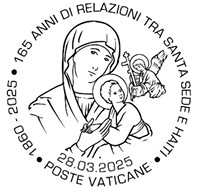
Daily
|
| Our Lady of Sorrows |
| Our Lady of Guadalupe |
| Our Lady of Perpetual Help |
| Our Lady of Mount Carmel |
Your answer was: Our Lady of Perpetual Help. |
Answer:  The 165th anniversary of the 1860 Concordat between the Holy See and the Republic of Haiti marks a pivotal moment in both ecclesiastical diplomacy and national identity. Signed under Pope Pius IX and Haitian President Fabre Geffrard, the concordat formally recognized Catholicism as the state religion of Haiti and established a diocesan structure, ending decades of ecclesiastical limbo following Haiti’s independence in 1804. This agreement was not merely administrative—it symbolized the Vatican’s long-delayed acknowledgment of the world’s first Black republic and its deep-rooted Catholic faith. The 2025 commemoration, which included the unveiling of a mosaic of Our Lady of Perpetual Help in the Vatican Gardens, reflects the enduring spiritual and cultural ties between the two states. Our Lady of Perpetual Help, the patroness of Haiti since 1942, is a Byzantine icon rich in theological symbolism. The image portrays the Virgin Mary holding the Child Jesus, who looks over His shoulder in terror at the Archangels Michael and Gabriel presenting the instruments of His future Passion—the cross, nails, spear, and sponge. One of Christ’s sandals dangles from His foot, symbolizing His haste to seek refuge in His mother’s arms. Mary’s gaze, however, is not on her Son but directed outward, toward the viewer, inviting all to seek her intercession. The golden background signifies divine light and eternal hope, while the star on her veil identifies her as the “Star of the Sea,” guiding the faithful through life’s storms. Reference • Haiti’s first concordat (1860) and Cardinal Antonelli’s Reply: Text • Understanding the Symbols in the Icon of Our Lady of Perpetual Help • What Are the Hidden and Powerful Symbols in the Icon of Our Lady of Perpetual Help? |